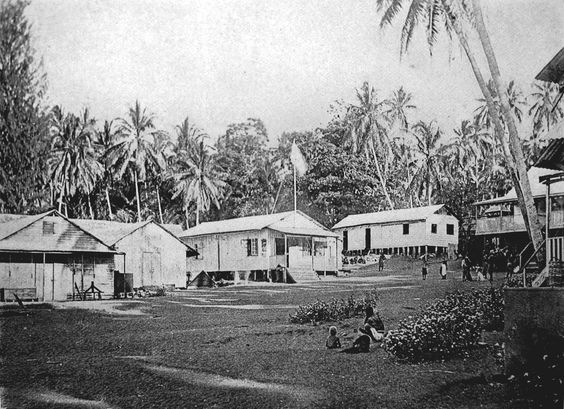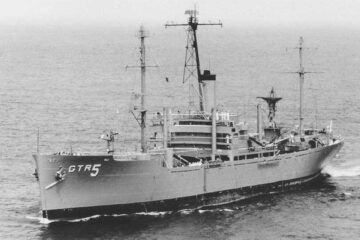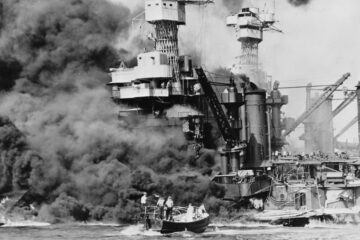After the Franco-Prussian war in 1870/1871 – in which my grandfather fought – two important developments happened:
- Prussia and its northern German territories united with the southern part of Germany. This became the start of Germany as we know it.
- Bolstered by the victory and the unification, Germany now wanted to obtain its own position on the world theatre.
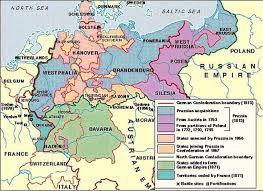
This put Germany right in competition with Britain who was the global superpower of the day. Germany had a great (Prussian) army but didn’t have a strong naval force, rather the opposite of the British situated. ‘Britannia ruled the waves”.
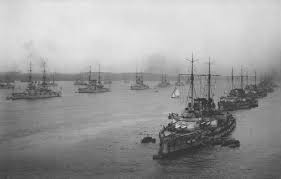
In becoming a world power, Germany had to built up its fleet and establish footholds across the world. Key here was the so called ‘coal stations’ where naval and merchant vessels could be secured of the supply of coal. These coal station needed to be fortified ports.
While some German States prior to unification had established some colonial footholds in Africa, they didn’t have strategic positions in Asia. After unification, with the new country’s new ambitions, this became a more urgent situation.
With Germany becoming stronger and stronger it became clear that there would be a challenge with the Brits; war was in the air. This would have an effect on:
- Netherlands, so close to German and with access to the sea;
- Netherlands East Indies strategically positioned in Asia; and
- Australia, strongly tied to Britain, possibly in danger of German invasion.
In his essay “German aims in the Netherlands Indies to 1914 – regional security under threat” (eg Australia), Dr Peter Overlack describes this situation in great detail.
The Netherlands with its Netherlands East Indies colonies was seen as key to those in the German Government keen to expand into Asia. The Netherlands would provide Germany with direct access to the North Sea and the 5000 km long Indonesian archipelago would provide Germany with plenty of opportunities for its aim to become a world power.
Obviously, Australia, still being a collection of British colonies was worried about such a scenario. As early as 1871, during a visit of the SS Curaçao to Australia, with on board the Consul-General of the Netherlands for Australia, New Zealand, and Tasmania, J.W. Ploos van Amstel, these issues were discussed with the various Australian authorities.
When the threat of war increased and the possibility that Germany could win such a war, Australia became more and more worried. In the pre-war situation, Germany put a lot of pressure on the Netherlands to join Germany (Anschluss) and open up their colonies to the Germans. While the pollical opinions in the Netherlands were somewhat divided in the end the strongly resisted these German advances.

At the same time they looked for collaborative projects to ease the political tension. They, established the Dutch-German Telegraph Company linking the German East Africa colonies with the German and Dutch colonies in the the Pacific and the East Indies, this bypassed the Eastern Extension Australasian and China Company; the British telegraph monopoly on this route. Thus achieving a ‘British-free line of communications’.
The Netherlands were aware of the fact that if a war broke out they had little hope of resisting a German occupation/annexation. Germany used the threat of an invasion of Japan into the Netherlands East Indies as its argument to try and win the Dutch over for allowing them into their colonies.
Under the title The menace of armaments the Sydney Morning on 6 September 1910 reports
| It is impossible to deny that Germany is rapidly providing herself with almost invulnerable bases in the North Sea. It is true that we may be asked where else she could provide them, but that does not affect the fundamental fact that they are within a few hours’ steam of Great Britain. (British journalist) Mr. Robert Blatchford may be too crude when he writes boldly that Germany intends to annex Holland and Belgium; but for two or three years past German railway development in that direction has been as ominous as anything well could be, with a great military power behind it. As it is, it is tolerably certain that Germany would not hesitate a moment to occupy Holland ¡ if a great war made that strategically desirable. |
In the pre-war negations Germany also wanted to get a secure coal station/port in Timor. This started to ring the alarm bells In Australia as this was only 800 kms from its mainland and an invasion of Germany into Australia was seen as a real possibility. Interestingly 100 years later similar alarm bells were raised with the possibility of China establishing a base in the Solomon Islands.
In the end as we know nothing eventuated. Amazingly Netherlands was able to stay neutral and instead the Germans marched into Belgium, where of course many Australian service men were lost during WWI.
In the end Germany was defeated and had to give the colonies its had. Peter Overlack concludes that in the running up to WWI German politics were divided in relation to its global expansion. Those against pursuing expansion mentioned that when they win the war, they then could easily take over some of the colonies of the other powers (namely Britain).
It is interesting to contemplate what the consequences could have been for Netherlands, Australia and Netherlands East Indies if that war had gone the other way.
Paul Budde
German New Guinea
In the nineteenth century, Germany ruled the northern half of the country for some decades, beginning in 1884, as a colony named German New Guinea. In 1914 after the outbreak of World War I, Australian forces captured German New Guinea and occupied it throughout the war. After the war, the League of Nations authorised Australia to administer this area as a League of Nations mandate territory that became the Territory of New Guinea and after its independence, Papua New Guinea in 1975.
